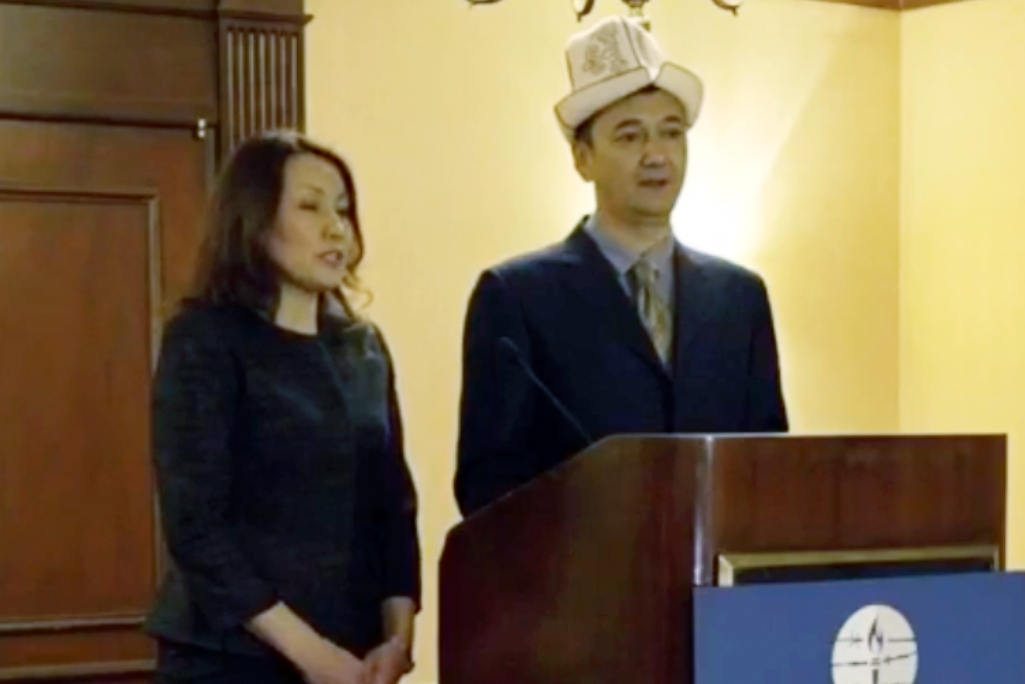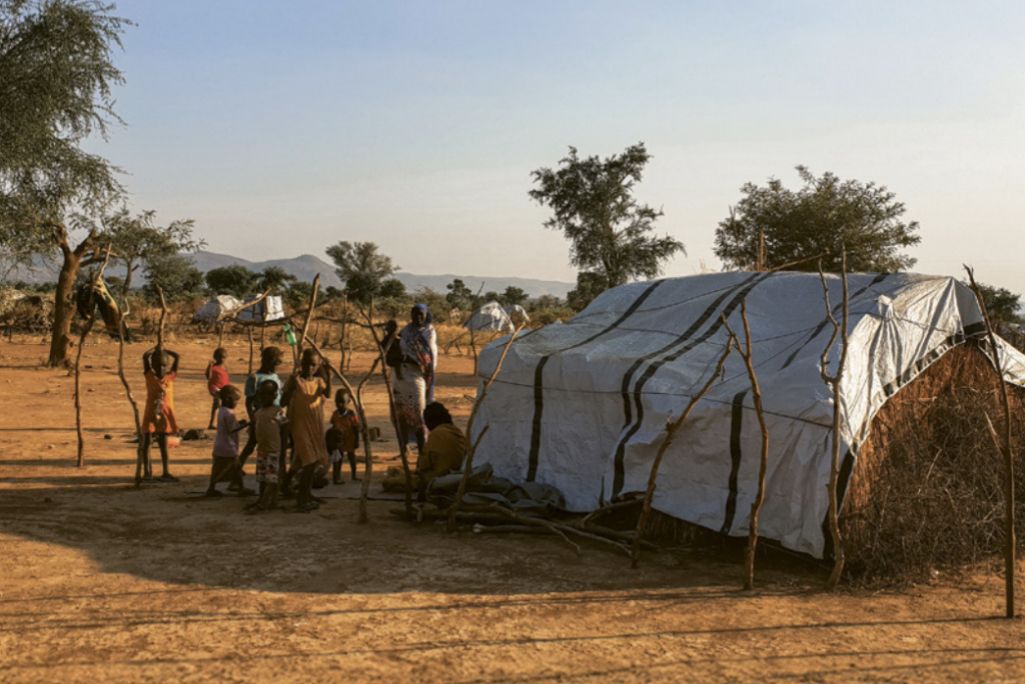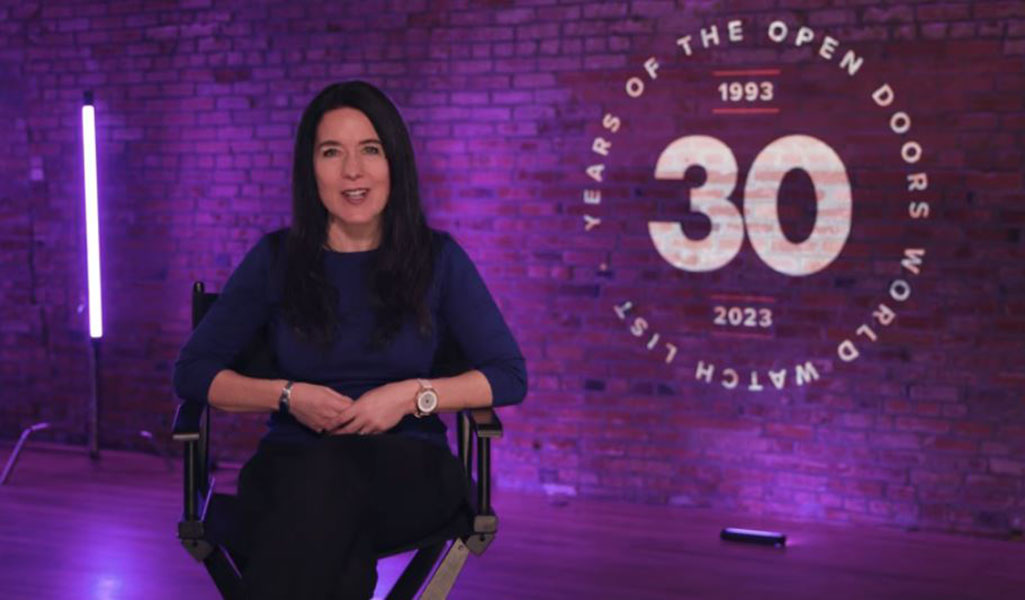
Ovalbek Turdakun, right, gives a press conference with the help of a translator April 13 in Washington, D.C.
A Christian who was imprisoned for 10 months in western China is now in the United States as a witness to the notorious “re-education” camps being operated by the Communist regime of the world’s most populous country.
Ovalbek Turdakun, his wife and son arrived in the United States April 8 after a lengthy, successful effort to avoid deportation back to China that was aided by allies in the United States and other countries. Ovalbek is the first Christian to speak out about his detention in the camps in Xinjiang Uyghur Autonomous Region, according to Axios, a news website that first reported on his arrival April 12.
The Chinese Communist Party (CCP) has primarily targeted the Uyghurs, a primarily Muslim group in Xinjiang, in a genocidal campaign, but other ethnic groups also have been included in its suppression. The CCP’s tactics have included widespread detention in “re-education” camps, forced labor and a coercive population control program of abortion and sterilization. The State Department under both Presidents Trump and Biden has determined China is guilty of genocide in Xinjiang.
Messengers to the Southern Baptist Convention’s (SBC) 2021 meeting resoundingly adopted a resolution that condemned the CCP’s oppression of the Uyghurs and called for the U.S. government to take “concrete actions” to end the genocide. The SBC reportedly became the first Christian faith group to denounce China’s campaign against the Uyghurs as genocide.
In a Washington, D.C., news conference April 13, Ovalbek described a 10-month detention by the Chinese government that included torture and forced injections. He was under house arrest for another eight months after his release from the camp in December 2018. An ethnic Kyrgyz, Ovalbek and his family walked across the border into Kyrgyzstan in December 2019 and eventually received aid in reaching the United States.
“I thank God that He brought me and my family safely here,” Turdakun said at the news conference through an interpreter. “I thank the American government.” He also thanked two members of the audience who were instrumental in his family’s arrival in this country.
Chelsea Sobolik, director of public policy for the Southern Baptist Ethics & Religious Liberty Commission (ERLC), said, “The Chinese Communist Party has continued to wage a heinous, systematic war against Christians, Uyghurs and other ethnic and religious minorities. Mr. Ovalbek, the first Christian detained who has been able to flee Xinjiang and come forward publicly about his experience, courageously shines a light on the genocide being committed by the CCP.
“Christians across the globe must continue to speak up in the face of this atrocity, and the ERLC will continue advocating for the religious freedom of all people in China,” she told Baptist Press in written comments.
Speakers at the news conference said they expect Ovalbek’s testimony will be invaluable in American and international efforts to hold the CCP accountable.
Rep. Chris Smith, R-N.J., told Ovalbek at the news conference, “We are inspired … by your courage, by your faith, by your commitment to human rights and by your very powerful and very keen powers of observation.
“[Y]our information, your leadership is critical,” Smith told him. While the focus is now on Russia’s assault on Ukraine, “we can’t take our focus off what is happening every single day in the concentration camps in Xinjiang.”
Rodney Dixon, a British lawyer specializing in international law, told the news conference audience Ovalbek “is going to be vital in providing more first-hand, inside information on what is happening in China and in neighboring countries.”
Dixon’s legal team has urged the International Criminal Court to investigate Tajikistan, which borders Xinjiang, about the disappearance of Uyghurs, apparently back to China. A report will be submitted soon requesting an investigation and prosecution of China, he said.
Ethan Gutmann, a fellow with the Victims of Communism Memorial Foundation, said he learned of the Ovalbek’s plight from the Uyghur Christian Network in Central Asia. He recognized some specific personal qualities in meeting with Ovalbek beginning in early 2020, Gutmann said:
- His “understanding of the long claw of Chinese security;”
- His “precision.” Ovalbek memorized details about the camp and cross-examined his fellow inmates, Gutmann said.
Chinese officials took Ovalbek from his home in Xinjiang in February 2018 because they said he had stayed longer on a previous trip to Kyrgyzstan than was allowed, Axios reported. Ovalbek and other inmates were tortured in “tiger chairs,” devices in which prisoners are frequently held in painful positions for hours or days. They were shocked with electric prods when they sought to change their positions, he said, according to Axios.
Other prisoners and he were forced to take pills and herbal teas, as well as “different kinds of injections,” Ovalbek said. The prisoners experienced hearing loss and fluids leaking from their ears after injections, he told Axios. He was unable to walk for months and had to be carried by other prisoners, Ovalbek said, according to Axios.
Sen. Marco Rubio R-Fla., and Smith urged the State Department and the Department of Homeland Security to speed up the family’s journey to the United States, Axios reported. Gutmann, China Aid President Bob Fu and Conor Healy, government director of IPVM, a leading authority on video surveillance, played important roles in helping Ovalbek and his family reach the United States.
The CCP’s oppressive practices in Xinjiang include tracking Uyghurs by means of a high-tech surveillance system that has obtained genetic data on many residents, according to reports. It is estimated more than 1 million of the 12 million Uyghurs, and maybe as many as 3 million, have been detained in “re-education” camps. Forced labor by prisoners is common. Life in the camps reportedly can result in indoctrination, as well as rape, torture and coercive organ harvesting. Uyghur women are also at the mercy of forced abortions and sterilizations.
In December, President Biden signed into law the Uyghur Forced Labor Prevention Act, a bill supported by the ERLC and other religious freedom and human rights organizations. The law prohibits products made with forced labor in Xinjiang from being introduced into the American market.
(EDITOR’S NOTE – Tom Strode is Washington bureau chief for Baptist Press.)


